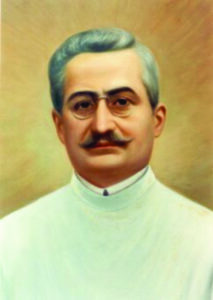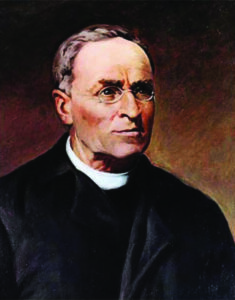November Saints
St Joseph Moscati
(1880-1927)
“Who is the one we today propose to the imitation and veneration of everyone? He is a layman, who made his life a mission completed with evangelical genuineness. He is a doctor, who made his profession a training ground for the apostolate and a mission of charity. He is a university teacher remembered by his students with a deep sense of gratitude and admiration. He is an haute école scientist, famous for his scientific contributions on an international scale. That is his life” (Pope Paul VI, who beatified him).
Joseph Moscati was the seventh of nine children in a prominent family of Benevento, Italy. His father was a magistrate, his mother a Marquise. When Joseph was four, the family moved to Naples. After his elementary education, he attended the Vittorio Emanuele Institute, from which he graduated with distinction. He started studying medicine in 1897 and graduated “summa cum laude” six years later. Contrary to the example of his peers, he had removed himself from all extremism and the sectarian bent of the university. After his graduation, university and the Incurables’ Hospital became his main fields of activity.
He worked always behind the scenes and was instrumental in saving many lives during the eruption of Vesuvius in 1906 and during the 1911 cholera epidemic. In 1914, his mother died. Her legacy? “Always avoid sin, which is the greatest evil of life”. Joseph never forgot her words.
During the First World War, he served in the front lines. As Professor of Medicine at Naples University, he was noted for his medical research. As a student, a doctor and a teacher he knew how to raise himself above the narrow circle of human studies to God, endless truth.
He healed, taught, and supported the poor and outcast, and could sometimes diagnose a patient’s illness and prescribe for it without having seen the patient. He knew when and how to use a patient’s faith and the sacraments to effect a cure. Many times, when he had visited a poor person, a sum of money would be found under the patient’s pillow after his departure.
On the Tuesday of Holy Week, 1927, after having gone to his daily Mass and received Holy Communion, Dr Moscati spent all morning at the hospital then came back home for a light meal, after which he went on seeing patients, but at about 3pm he didn’t feel well. He sat down in an armchair, crossed his arms, and died quietly. He was canonised by Pope John Paul II in 1987.
Saint Joseph, help us to go out of our way to bring help and comfort to the sick.
Source: internet, various
St Vincenzo Grossi
(1845-1917)
Vincenzo Grossi was born in Cremona, Italy, to Baldassare Grossi and Maddalena Capellini, the last of seven brothers. As a child, he learned from his mother how to pray, and learned about the seriousness of work from his father, lessons he never forgot.
After the reception of his first Communion, he announced to his family his desire to become a priest. When he was old enough and desired to enter the seminary, his father wanted him to stay with the family, but ultimately gave in to his son’s wishes. Despite this, he was forced to postpone his plans due to family reasons, so he worked in his father’s mill for a brief period of time. He entered the seminary on 4 November 1864 in Cremona. He was ordained a priest on 22 May 1869. He was stationed as a parish priest in Regona and Vicobellignano in 1873 and 1883 respectively, where he dedicated himself to the poor.
He founded the Daughters of the Oratory in 1885 as a religious institute of pontifical right, whose members make public vows of poverty, chastity and obedience. Their mission is primarily for instruction and Christian education of children and youth, and their way of life is governed by the rules of St Philip Neri. Grossi focussed on youth outreach and he would help young people realise their vocations. The Oratory carried on his focus. He chose a life of poverty, and became well-known for his work with children as well as for his preaching abilities.
He died on 7 November 1917 at the age of 72, uttering the words: “the way is open, we must go”.
Saint Vincenzo, inspire us with a genuine love and care for the poor.
Source: Wikipedia


 Entries(RSS)
Entries(RSS)